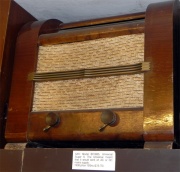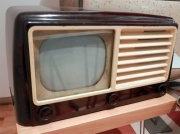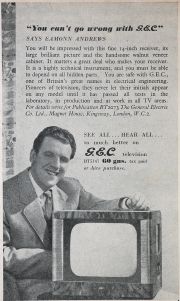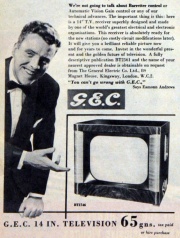Difference between revisions of "GEC: Radio and Television"
| Line 53: | Line 53: | ||
1960 A new company was formed in conjunction with [[Pillar|Pillar Holdings]] to extend the system of Piped Television that it owned in South Wales; the company would be called '''General Piped Television''' Ltd; [[GEC]] had a minority interest<ref>The Times, Jan 07, 1960</ref>. GEC did preparatory research for the company and manufactured the equipment. Pillar agreed not to sell televisions outside Wales. | 1960 A new company was formed in conjunction with [[Pillar|Pillar Holdings]] to extend the system of Piped Television that it owned in South Wales; the company would be called '''General Piped Television''' Ltd; [[GEC]] had a minority interest<ref>The Times, Jan 07, 1960</ref>. GEC did preparatory research for the company and manufactured the equipment. Pillar agreed not to sell televisions outside Wales. | ||
1961 GEC acquired [[Radio and Allied Industries]] | |||
1962 [[GEC]] sold its shares in General Piped Television to [[Pillar|Pillar Holdings]]<ref>The Times, Nov 29, 1962</ref> | 1962 [[GEC]] sold its shares in General Piped Television to [[Pillar|Pillar Holdings]]<ref>The Times, Nov 29, 1962</ref> | ||
Revision as of 19:36, 19 October 2021


















Note: This is a sub-section of GEC
WWI Heavily involved in war work including making radios and valves
1922 Participated in the formation of the British Broadcasting Company
1923 Introduction of the Gecophone crystal detector radio set no. 1.[1]
1930 Advert for a 3 valve, all-electric GECoPhone radio operated by a.c. mains; price included Osram valves[2].
1936 Demonstration of GEC television sets at Wembley receiving signals from the BBC transmitter at Alexandra Palace; the sets could receive both the 25 frames/s and the 50 frames/s signals that the BBC transmitted [3]. Started production of cathode ray tubes.
1939 Competition in radios continued to depress prices[4].
1960 A new company was formed in conjunction with Pillar Holdings to extend the system of Piped Television that it owned in South Wales; the company would be called General Piped Television Ltd; GEC had a minority interest[5]. GEC did preparatory research for the company and manufactured the equipment. Pillar agreed not to sell televisions outside Wales.
1961 GEC acquired Radio and Allied Industries
1962 GEC sold its shares in General Piped Television to Pillar Holdings[6]
1975 GEC (Radio and Television) Ltd was one of GEC’s Consumer Products businesses.
1977 of Hirwaun Industrial Estate, Rhigos, near Aberdare.
















